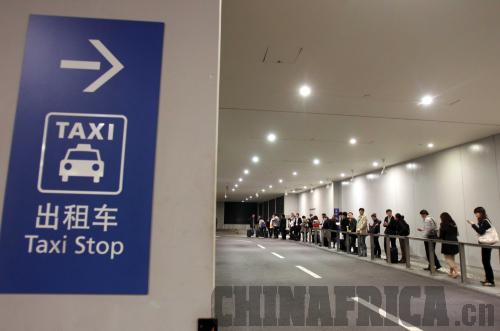|
 |
|
Office workers wait in a queue at a taxi stand near the Shanghai World Financial Center at midnight on November 11, 2011, after working extra hours (LIU YING) |
Updated criteria for identifying workers as "white collar" have been widely discussed by netizens in China in the past few months.
Drafted in early 2012, the new criteria set the financial requirements for a white collar: a monthly salary exceeding 20,000 yuan ($3,260), owning an apartment with at least two bedrooms and a car worth around 150,000 yuan ($24,450).
This new standard put entry to the club out of reach for most workers.
"Four years ago, people with an annual salary of 100,000 yuan ($16,130) were regarded as white collar. Just as I finally managed to earn that much, the standard has more than doubled," said an online post by Tangbo Xiaohu.
An online survey conducted by the Beijing-based Legal Evening News and Chinese recruitment website 51job.com in May showed that only three of 562 participating office workers reported meeting all the new requirements.
"The criteria show there is a big gap between Chinese white-collar workers' expected salaries and reality, which puts them in a constant state of insecurity and anxiety," said Xia Xueluan, a professor of social psychology at Peking University.
Uneasy life
The definition of white collar in China has evolved a lot since the term was first introduced to China in the 1990s. Decent pay, well-fitted suits and fashionable lifestyles have been the typical impression of white collars among the Chinese public. But in recent years, the phrase has carried more burdens than benefits.
"If you asked a college graduate in the late 1990s and early 2000s about his or her ideal job, more than 50 percent would list white collar worker as the first," said Xia. "But now, less than 10 percent would make that choice."
Kong Ranran, a college student majoring in accounting at Peking University's Guanghua School of Management, said that her first job choice is definitely not accounting powerhouses including PriceWaterhouseCoopers (PwC), Deloitte & Touche, KPMG and Ernst & Young.
"Those accounting firms used to be my ideal work destinations and I had dreamed of working there since I was a fresh student in university," said Kong. But she completely changed her mind after a three-month internship at PwC in the summer of 2012.
About a year earlier, Pan Jie, an auditor working for PwC in Shanghai, died of fever-induced complications due to overwork at the age of 25.
"I saw the tough situation behind the scenes and it was definitely not appealing," said Kong. "The work hours are endless and it is impossible to squeeze in any time for leisure or anything else."
Kong's first choice is now civil service, which is the ideal choice among many of her classmates, especially the females. "We need to get married and have babies but we see no hope if we just work, work and work every day," she said.
Ning Xin, who worked at a law firm in Beijing, recently quit her job and decided to go to the United States for further study. "With so many graduates coming back from abroad every year, it is not the best choice as I might have a hard time looking for jobs after my graduation in the United States, but I can't think about that much as my present work is driving me mad," said Ning.
Ning, during her two years of work in the law firm, took no vacations at all. On most weekends, she was either working in the office or flying to another city on business.
"Business trips are not as fancy as they sound; we just stayed in hotel rooms and worked on projects day and night," said Ning, who has been to Hangzhou, a famous tourist destination in east China's Zhejiang Province, at least 10 times, but hasn't gotten a chance to walk around West Lake, the most-visited site in the city, for more than one hour.
|